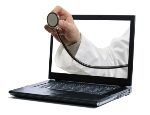by Sara Teichholtz
First posted on Teich Does Medicine on 6/19/2012
by Sara Teichholtz
First posted on Teich Does Medicine on 6/19/2012
Learning medicine is often compared to learning a new language. Standing amongst specialists discussing some disease I haven’t heard of is probably when this is the most accurate (and also when said specialists like to ask me the most questions about what’s being discussed). At least here, I can comfort myself with the fact that sometimes the Nepalese doctors actually are speaking a different language.
Medicine also comes with a whole new set of skills. Whenever I’ve gone to the doctor, it always seems so effortless how they float around me, taking blood pressure and feeling glands. Looking at my own Objective Structured Clinical Exam (OSCE), the only thing I’m good at so far is sitting really far away from my patient looking terrified with my feet in eagle pose to comfort myself. Somehow, over time, we’re all able to magically maneuver the blood pressure cuff onto the patient and deal with all three pieces using only two hands. (Who designed this?)
Some of these skills have transferred over to the third world. Yesterday in the triage station, I took blood pressures on more people in three hours than I’ve taken in my entire first year of medical school, straining to listen for the pulses while surrounded by hundreds of very chatty Nepalese patients. My preceptor is going to be so impressed when I get back.
History-taking skills are a little bit more difficult. Taking a complete history in the states usually took about 20 minutes, but here it takes over an hour with a translator. Part of the problem is that most people here have multiple chief complaints (abdominal pain, joint pain, and eye problems are seen in almost everybody), but it’s also very tedious to have to go back and forth with the translator. We know a few key phrases in Nepalese (pain, menstrual period), but yesterday I asked the translator how to say “wait here” and apparently pronounced it in such a way that I said something VERY dirty. All of the patients were laughing at me (morso than usual), so I’m a little bit cautious now.
Along with getting way better at taking blood pressures, we’re picking up a lot of new skills here that will translate back home. Our OSCE facilitators would be super proud of all of our abdominal, heart, lung, neuro, and musculoskeletal exams. Once on the wards, we’ll all be very familiar with the drugs used to treat peptic ulcer disease. Some skills, however, will unfortunately remain here. We most likely will not have to recall off the top of our heads the correct dosage of albendazole for de-worming, and will probably not immediately respond to a chief complaint of “cough” with “weight loss bloody sputum loss of appetite fever night sweats?!?!” (said very rapidly while putting a mask on both the patient and ourselves as we begin to self-diagnose our increasing dyspnea as incubation-period-free tuberculosis). While these skills may not transfer back home, they are still incredibly useful as they round out our American education, where these conditions are understandably not emphasized in the curriculum.
Along with these medical skills, we’re learning lots of new habits while living somewhere other than the first world. When faced with bathrooms that are no more than porcelain holes in the ground with adjacent foot rests, we no longer respond with panic. (The same cannot be said about the lack of toilet paper). Given the scarcity of both electricity and WiFi, I’m now better at using my iPhone for its flashlight capabilities rather than its intended use. Not sure if it’s a related skill or just luck, but so far I’ve been pretty good at navigating the field between our dining room and hotel room in the dark while avoiding cow droppings.
I’ve become incredibly skilled at using cups and my Snellen eye chart to capture the crickets who like to hang out on my bed. Unfortunately, after perfecting this skill by doing it 8 million times, I no longer use it as I’ve become much better at just ignoring the bugs out of laziness. The next time I’m able to shower without the company of several crickets and that weird big beetle thing that’s been hanging out under our sink (is it dead, Katie?), I’ll probably feel a little lonely. Also, showers here are simply showerheads coming out of the wall in the bathroom, and I’m honestly not sure I’ll remember what to do with a shower curtain the next time I encounter one. While all of these things have been adjustments, it’s still important to remember that our standard of living is still pretty luxurious given our setting.








